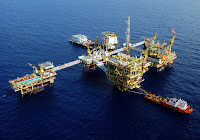 Last week was an eventful one in crude terms. Well it’d have to be if Shell and Exxon Mobil declare bumper profits. Both saw their quarterly profits almost double. Beginning with Shell, the Anglo-Dutch firm reported profits of US$4.5 billion on a current cost (of supply) basis, up from US$2.3 billion noted over the corresponding quarter last year.
Last week was an eventful one in crude terms. Well it’d have to be if Shell and Exxon Mobil declare bumper profits. Both saw their quarterly profits almost double. Beginning with Shell, the Anglo-Dutch firm reported profits of US$4.5 billion on a current cost (of supply) basis, up from US$2.3 billion noted over the corresponding quarter last year.Excluding one-off items, Shell's profit was $4.2 billion, compared with $3.1 billion last year. Unlike BP, Shell said it would pay a second quarter dividend of $0.42 per share. The oil giant's restructuring plans also appear to be bearing fruit achieving cost savings of $3.5 billion, beating the stated corporate savings target by about 15% and some six months ahead of schedule.
Furthermore, it is thought that as a result of the restructuring, 7,000 employees would leave Shell nearly 18 months ahead of schedule. It also said it expected to sell $7-$8 billion of assets over 2010-11. Concurrently, oil giant Exxon Mobil reported quarterly profits of $7.6 billion, well above the $4.1 billion it posted over the corresponding quarter last year. Revenue for the quarter rose 23% in year over year terms on annualised basis from $72.5 billion to $92.5 billion.
Meanwhile, rival BP reported a record $17 billion second quarter loss which the market half expected. The figure included funds to the tune of $32 billion set aside to cover the costs of the oil spill in the Gulf of Mexico.
Sticking with BP, it has emerged that the beleaguered oil giant included a tax credit claim of almost $10 billion in its Q2 results as it seeks to take the edge off the impact of the Gulf of Mexico oil spill on its corporate finances. Its income statement for the second quarter carries a pre-tax charge of $32.2 billion related to the oil spill and a tax credit of $9.79 billion.
Under domestic tax laws in the US, BP is entitled to deduct a proportion of its losses against US tax. The issue is likely to turn political – especially in an election year, when much more has been made out of far less. However, legally the US government can do precious little to prevent BP from claiming the tax credit.
Crude asset sales seem to be the order of the day. Following on from BP’s sale of assets and Shell’s announcement that it will sell too, news emerged that the Russian government also wants to join the party.
It plans to sell $29 billion worth of assets (not all which are energy sector assets) on the open markets. In the absence of official confirmation, local media speculation suggests minor stakes in Rosneft and Transneft may be put up for sale.
However, speaking to reporters in Moscow on July 29th, the country’s Finance Minister Alexei Kudrin said, "We will sell significant stakes in state companies on the market. We plan to keep controlling stakes. Assets will be valued publicly, in line with market prices and tenders will be open. We are fully ruling out a situation when somebody sells something to someone at an artificially low price."
According to communiqués, the Russian government wanted to rake in $10 billion next year from asset sales. It has also approved a decision to increase mineral extraction taxes on gas producers by 61% from 2011.
Finally from a macro strandpoint, market consensus and comments from BP, Shell and Exxon officials seem to indicate that the top bosses of all three see mixed signals in the global economy. While their earnings figures, excluding BP for obvious reasons, have improved markedly from the quarterly lows of 2009, the overall industry outlook remains uncertain.
© Gaurav Sharma 2010. Photo courtesy © Shell


 Crude prices dipped yet again last week, especially towards the end of the week, as bearish trends witnessed in the wider financial markets clobbered commodities. Additionally, the
Crude prices dipped yet again last week, especially towards the end of the week, as bearish trends witnessed in the wider financial markets clobbered commodities. Additionally, the 


